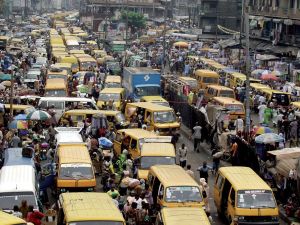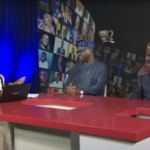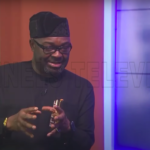DANGERS OF THE EMERGING REPUBLIC OF LAGOS
A common constitutional argument in Nigeria is the fact that as a Federal Republic; the states should be the strongest tier of government with a weak centre giving the states power and room to assert their individuality. This is the case with most Federations in the world from USA, Germany to Australia and so on. It is therefore considered as odd; the super strength of the centralised Nigerian Federal governmental status quo which has consequently  emasculated the states and its ability to carve out unique identities and exercise esoteric powers in the interest of the peoples of each state. This has led to repeated cry for decentralisation of the Police and many federalised institutions in Nigeria as an example.
emasculated the states and its ability to carve out unique identities and exercise esoteric powers in the interest of the peoples of each state. This has led to repeated cry for decentralisation of the Police and many federalised institutions in Nigeria as an example.
The counter argument against the perceived foregoing purist stance by many “pragmatists” is that the states in Nigeria are not mature enough and cannot be trusted to acts in the interest of Nigerians (as one nation) were they to be left fully to their own devices. That the governors of these states will become mini emperors exercising total powers for self-interest at the expense of opposition actors and could endanger the existential reality of a united Nigeria nation.
There are clearly signs that the fears of the pragmatists are not imaginary. Many will recall the effect of the declaration of Sharia in many Northern states during Obasanjo regime and how that has affected not only the Muslims must non-Muslims in those states; thus making some of these northern states a no-go area for some Nigerians or at least a place where they now lead cautious existence compared to when they are in non-sharia states. By the way this is not a Boko Haram phenomenon although that has exacerbated the problem. But these are not my focus primarily in this article.
The fundamental principle of a federal republic is that citizens can travel and live freely anywhere in that country without being made to feel like a foreigner in their own fatherland. So an Hausa man can move from Kano and reside in Lagos (or travel through it) without any problem at all and more importantly; without having to feel he is in another country completely and vice versa. This is where Lagos and its government need to be careful not to create a de facto immigration border on the Lagos end of the expressway for Nigerians coming into Lagos.
Many (including myself) have commended the progressive stance of the Fashola Administration in Lagos. But I am beginning to feel that a primordial case of a national Tale of two Cities seem to be emerging and getting worse by many of the new legislations coming into effect in Lagos. In the past few years; Lagos have enacted many new laws that makes demand not just of Lagos residents; but all that pass through Lagos territories, even for just one day. Like I said earlier many of the key state institutions in Nigeria are centralised with the Federal government, allegedly to help create a commonality across the nation. For instance; the FRSC issues Drivers Licence. This allows you to drive anywhere in Nigeria; just like a Lawyer certified after finishing Law School can practice in any state within Nigeria.
But with many local legislations coming from Lagos state covering many of these same areas; there is emerging not just a regulatory duplication but added burden to operate in Lagos compared to other parts of the nation. For instance; Lagos state enacted a law making it  mandatory for all commercial and official drivers driving within the state’s territory to be certified by the State’s driving agency. This on the face of it looks good. But if you are a commercial driver based in Rivers state and coming to Lagos for just one day on business; what are you going to do? Will you be expected to go through the process of certification first before you can drive within Lagos even though you are not a Lagos resident?
mandatory for all commercial and official drivers driving within the state’s territory to be certified by the State’s driving agency. This on the face of it looks good. But if you are a commercial driver based in Rivers state and coming to Lagos for just one day on business; what are you going to do? Will you be expected to go through the process of certification first before you can drive within Lagos even though you are not a Lagos resident?
Now there are new laws making it illegal to eat, make a phone call etc while driving in Lagos. While this is a good and progressive stance; but that will criminalise in Lagos what is perfectly legal in the other 35states of Nigeria. So a non-Lagos driver coming from Kano will now have to behave substantially differently only in Lagos. Accordingly you will have to rush and finish that meat pie you are eating as you approach Berger bridge into Lagos.
Don’t get me wrong; I am not saying there is anything iniquitous with many of the forward-looking statutes that have been enacted in Lagos. But I am sounding a warning that this could create unwittingly a Republic of Lagos within the Nigerian nation state. A state where Nigerians will have to behave significantly differently from all other states. I am also warning that it could become counter productive for Lagos residents if other states in Nigeria decide to enact an anti Lagos legislations. For instance; what if each state decides to do exactly what Lagos is doing. That will mean a Lagos resident will need to obtain certifications from ten different states before he can drive from Lagos to Kano. What if other states decide to bring laws that prescribe what you can and cannot do while driving in their states. That will mean a driver from Lagos will have to adjust his behaviour markedly at the border of each state or risk arrest.
While I agree there is need for Lagos to set the pace for others as it has a unique capacity and means to do so; a Yoruba adage should inform their speed and pace of transformation. That is; a rich man in the family of ten poor men is ultimately the eleventh poor man. That is because the needs and demands of the ten poor men will impoverish the one rich man. So it is in the interest of the one rich man to help others to be wealthy more speedily. Lagos cannot isolate itself from the realities of the Nigerian existence. And in most federal countries where powers are fully devolved to the states; things work on the basis of reciprocity. That is; all states will recognise the instruments issued by one another without imposing any additional demands. Also (while some differences may still exist), most states have tried to harmonise much of their public requirements in order to minimise the burden on new state residents. For instance in the USA; Drivers Licence are issued only by the State governments. But a Licence obtained from New York is fully recognised by all other states in America. So you can drive through any state in the union with your New York licence without any problem.
Hence as Lagos is part of a federation it is in its interest to carry other states along or risk possible reprisals against its own residents by other states. Such development portends badly for the spirit of one Nigeria. Lagos should try to minimise the plethora of new legislation it is churning out or at least create some exemptions for non- residents of the state. Nigerians should not be made to feel they need a visa (and legal training) to travel to Lagos from other parts of the nation; a perception that will be further entrenched by any new legislation peculiar only to the state. Lagos needs to show leadership by helping to spread best practice to other states as much as possible.
residents of the state. Nigerians should not be made to feel they need a visa (and legal training) to travel to Lagos from other parts of the nation; a perception that will be further entrenched by any new legislation peculiar only to the state. Lagos needs to show leadership by helping to spread best practice to other states as much as possible.
I accept the inherent contradictions in my desire to encourage the emergence of Lagos as a global mega city and the need to avoid a two-tier country where Lagos is thousands of kilometres ahead of all other states in ways that can create unnecessary envy and cause a possible backlash from other states. Truth is; all other states can make life difficult for Lagosians should they want to. Can you imagine Ogun state requiring all drivers on its road to buy a special permit for instance? That will mean you cannot travel out of Lagos easily without buying an additional permit to do so. It will become like buying a visa to be able to leave Lagos and another one on your way back. So as you can see, States working together in a collaborative manner and working on the basis of reciprocity (fuelled by consultation with each other) will allow Lagos to move ahead as it is doing but on the basis of an agreed national consensus with its partners; rather than the current we can do what we like approach of the state at the moment.
So my advise to Fashola will be for him to try and find ways of making his laws work for the benefit of all. This can easily be done through the implementation procedures and policies adopted by its officials. For instance many years ago; I travelled to Orlando in Florida with my then four year old daughter. I was a resident of the UK at that time. I was allowed to drive in Florida on my UK licence for the duration of the vacation. One day I was stopped by the Florida police and was going to be given a fine for not having a special  booster car seat for my daughter. I explained that I was not a Florida resident (by showing them my UK licence) and that in the UK (at that time) there was no law against what I was doing. The police officer immediately reversed his decision and apologised telling me that as I was not a resident and unaware of the requirement he was using his discretion to allow me to go. And that as I was leaving Florida the following day, he said there was no need to buy a car seat that will not be required in the UK. Now that is an example of how a state specific law can be implemented but in a way that still allows non-residents to not feel victimised. Clearly if I was going to be in Florida for six months for instance; I would have needed to buy the car seat. Hence there should be a human face to the implementation of many of the Lagos legislations. Officials should be well trained and informed (as well as monitored) to use their discretion when dealing with Nigerians just passing through Lagos compared to a Lagos resident driving a Lagos coloured public transport for instance.
booster car seat for my daughter. I explained that I was not a Florida resident (by showing them my UK licence) and that in the UK (at that time) there was no law against what I was doing. The police officer immediately reversed his decision and apologised telling me that as I was not a resident and unaware of the requirement he was using his discretion to allow me to go. And that as I was leaving Florida the following day, he said there was no need to buy a car seat that will not be required in the UK. Now that is an example of how a state specific law can be implemented but in a way that still allows non-residents to not feel victimised. Clearly if I was going to be in Florida for six months for instance; I would have needed to buy the car seat. Hence there should be a human face to the implementation of many of the Lagos legislations. Officials should be well trained and informed (as well as monitored) to use their discretion when dealing with Nigerians just passing through Lagos compared to a Lagos resident driving a Lagos coloured public transport for instance.
The dangers of an emerging republic of Lagos are many; not just for Lagos government and residents; but for Nigeria as a Federal Republic. If these implementation discretion is not in place as suggested; new economic traffic could be diverted away from Lagos; thus delivering a blow to the economic growth of the state that would otherwise have been the case. So, well done Fashola for many of the legislations to modernise Lagos; but remember the Yoruba adage that says if you send a slave to go and deliver a message; he does not have to deliver the message like a slave. Lagos can only truly develop in the spirit on one Nigeria.



